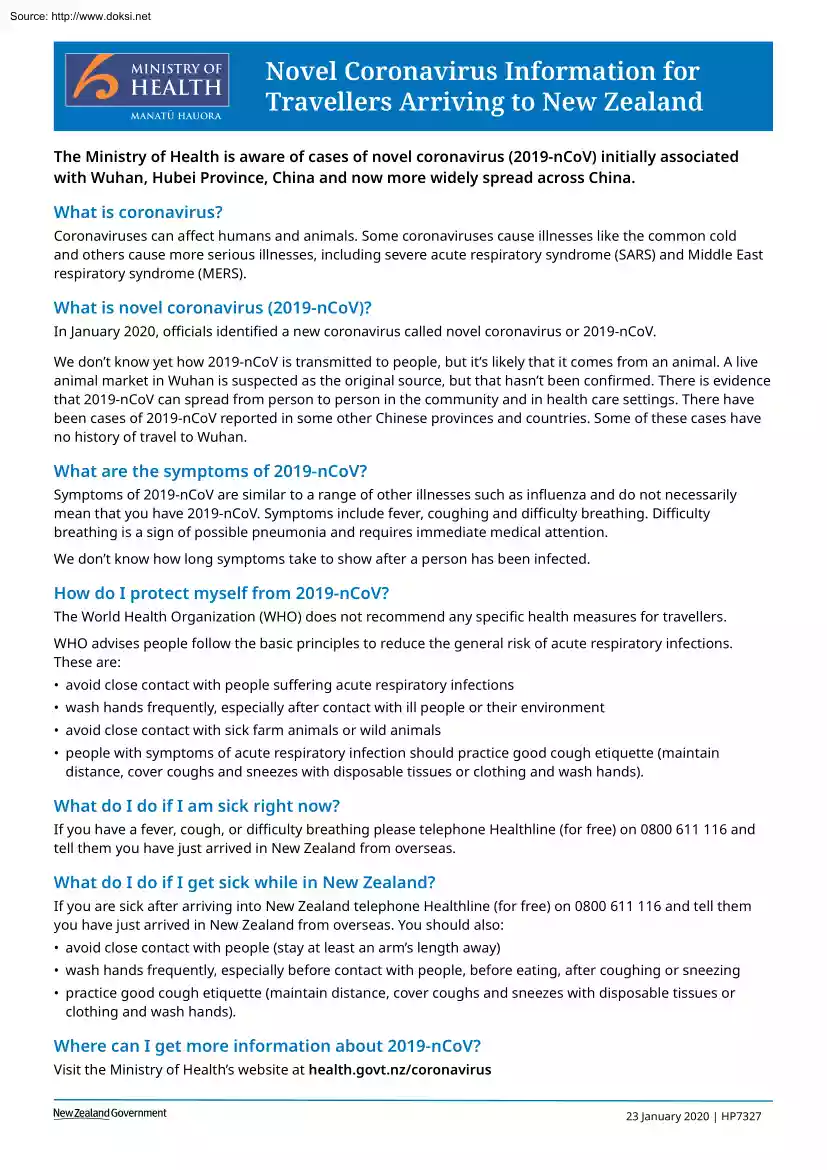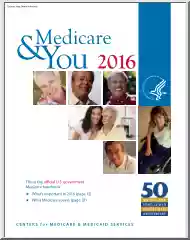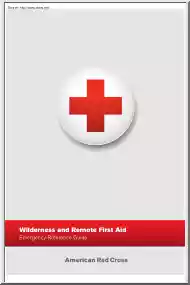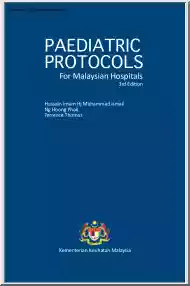Comments
No comments yet. You can be the first!
What did others read after this?
Content extract
Source: http://www.doksinet Novel Coronavirus Information for Travellers Arriving to New Zealand The Ministry of Health is aware of cases of novel coronavirus (2019-nCoV) initially associated with Wuhan, Hubei Province, China and now more widely spread across China. What is coronavirus? Coronaviruses can affect humans and animals. Some coronaviruses cause illnesses like the common cold and others cause more serious illnesses, including severe acute respiratory syndrome (SARS) and Middle East respiratory syndrome (MERS). What is novel coronavirus (2019-nCoV)? In January 2020, officials identified a new coronavirus called novel coronavirus or 2019-nCoV. We don’t know yet how 2019-nCoV is transmitted to people, but it’s likely that it comes from an animal. A live animal market in Wuhan is suspected as the original source, but that hasn’t been confirmed. There is evidence that 2019-nCoV can spread from person to person in the community and in health care settings. There have been
cases of 2019-nCoV reported in some other Chinese provinces and countries. Some of these cases have no history of travel to Wuhan. What are the symptoms of 2019-nCoV? Symptoms of 2019-nCoV are similar to a range of other illnesses such as influenza and do not necessarily mean that you have 2019-nCoV. Symptoms include fever, coughing and difficulty breathing Difficulty breathing is a sign of possible pneumonia and requires immediate medical attention. We don’t know how long symptoms take to show after a person has been infected. How do I protect myself from 2019-nCoV? The World Health Organization (WHO) does not recommend any specific health measures for travellers. WHO advises people follow the basic principles to reduce the general risk of acute respiratory infections. These are: • avoid close contact with people suffering acute respiratory infections • wash hands frequently, especially after contact with ill people or their environment • avoid close contact with sick farm
animals or wild animals • people with symptoms of acute respiratory infection should practice good cough etiquette (maintain distance, cover coughs and sneezes with disposable tissues or clothing and wash hands). What do I do if I am sick right now? If you have a fever, cough, or difficulty breathing please telephone Healthline (for free) on 0800 611 116 and tell them you have just arrived in New Zealand from overseas. What do I do if I get sick while in New Zealand? If you are sick after arriving into New Zealand telephone Healthline (for free) on 0800 611 116 and tell them you have just arrived in New Zealand from overseas. You should also: • avoid close contact with people (stay at least an arm’s length away) • wash hands frequently, especially before contact with people, before eating, after coughing or sneezing • practice good cough etiquette (maintain distance, cover coughs and sneezes with disposable tissues or clothing and wash hands). Where can I get more
information about 2019-nCoV? Visit the Ministry of Health’s website at health.govtnz/coronavirus 23 January 2020 | HP7327
cases of 2019-nCoV reported in some other Chinese provinces and countries. Some of these cases have no history of travel to Wuhan. What are the symptoms of 2019-nCoV? Symptoms of 2019-nCoV are similar to a range of other illnesses such as influenza and do not necessarily mean that you have 2019-nCoV. Symptoms include fever, coughing and difficulty breathing Difficulty breathing is a sign of possible pneumonia and requires immediate medical attention. We don’t know how long symptoms take to show after a person has been infected. How do I protect myself from 2019-nCoV? The World Health Organization (WHO) does not recommend any specific health measures for travellers. WHO advises people follow the basic principles to reduce the general risk of acute respiratory infections. These are: • avoid close contact with people suffering acute respiratory infections • wash hands frequently, especially after contact with ill people or their environment • avoid close contact with sick farm
animals or wild animals • people with symptoms of acute respiratory infection should practice good cough etiquette (maintain distance, cover coughs and sneezes with disposable tissues or clothing and wash hands). What do I do if I am sick right now? If you have a fever, cough, or difficulty breathing please telephone Healthline (for free) on 0800 611 116 and tell them you have just arrived in New Zealand from overseas. What do I do if I get sick while in New Zealand? If you are sick after arriving into New Zealand telephone Healthline (for free) on 0800 611 116 and tell them you have just arrived in New Zealand from overseas. You should also: • avoid close contact with people (stay at least an arm’s length away) • wash hands frequently, especially before contact with people, before eating, after coughing or sneezing • practice good cough etiquette (maintain distance, cover coughs and sneezes with disposable tissues or clothing and wash hands). Where can I get more
information about 2019-nCoV? Visit the Ministry of Health’s website at health.govtnz/coronavirus 23 January 2020 | HP7327





